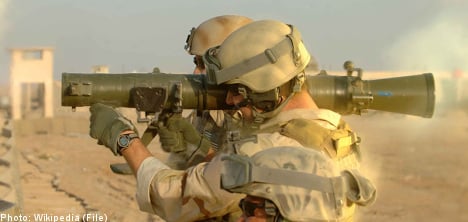World military spending rose only 1.3 percent in 2010 to $1.63 trillion, after average annual growth of 5.1 percent between 2001 and 2009, the Stockholm International Peace Research Institute (SIPRI) said as it released its latest report on international military expenditures.
“In many cases, the falls or slower increase represent a delayed reaction to the global financial and economic crisis that broke in 2008,” the group said in a statement.
The United States significantly slowed its military investments last year but remained by far the biggest defence spender in the world and still accounted for almost all of global growth.
US defence spending grew by only 2.8 percent in 2010 to $698 billion, after averaging growth of 7.4 percent between 2001, when SIPRI began publishing its reports, and 2009.
Despite the slowdown, the United States’ spending increase of $19.6 billion still accounted for nearly all of the $20.6 billion global increase last year.
“The USA has increased its military spending by 81 percent since 2001, and now accounts for 43 per cent of the global total, six times its nearest rival China,” Sam Perlo-Freeman, the head of SIPRI’s Military Expenditure Project, said in a statement.
“At 4.8 percent of GDP, US military spending in 2010 represents the largest economic burden outside the Middle East”, he said.
The region with the largest increase in military spending last year was South America with 5.8 percent growth, reaching a total of $63.3 billion
“This continuing increase in South America is surprising given the lack of real military threats to most states and the existence of more pressing social needs,” said Carina Solmirano, the project’s Latin America expert.
In Europe, military spending fell by 2.8 percent as governments cut costs to address soaring budget deficits, SIPRI said, noting that cuts were particularly heavy in the more vulnerable economies of Central and Eastern Europe and in Greece.
In Asia, the region’s weaker economic performance in 2009 saw defence expenditures grow by only 1.4 percent, with China leading the way with an estimated $119 billion in defence spending last year.
“The Chinese government, for example, explicitly linked its smaller increase in 2010 to China’s weaker economic performance in 2009,” SIPRI said.
Countries in the Middle East spent $111 billion on arms last year, an increase of 2.5 percent over 2009, with Saudi Arabia the region’s biggest spender.
In Africa, spending increased by 5.2 percent, led by major oil-producers such as Algeria, Angola and Nigeria.
The think tank, which specialises in research on conflicts, weapons, arms control and disarmament, was created in 1966 and is 50-percent financed by the Swedish state.



 Please whitelist us to continue reading.
Please whitelist us to continue reading.
Member comments